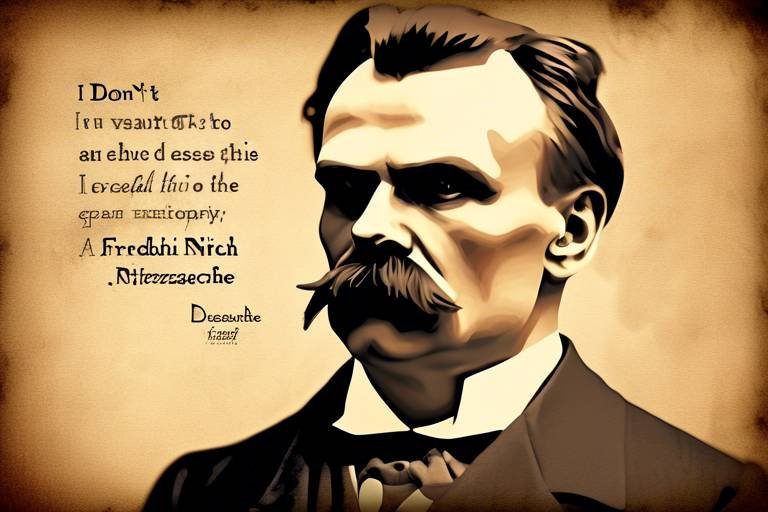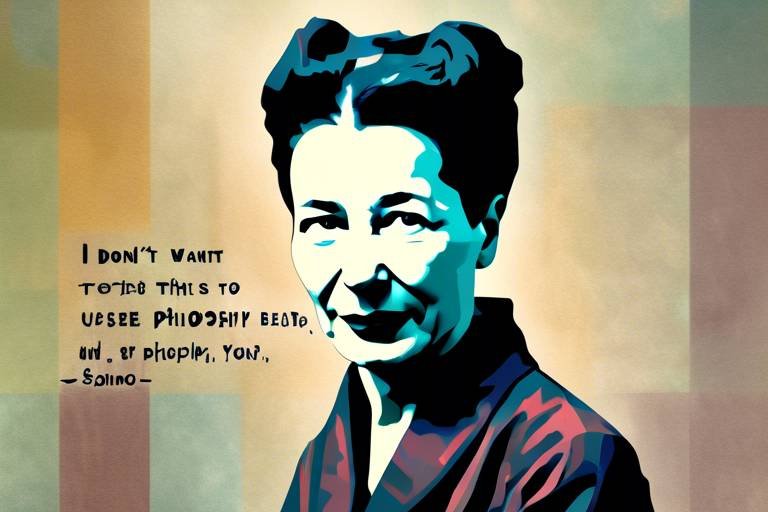Feminism and Revolution - The Ideas of Simone de Beauvoir
Simone de Beauvoir, a name that resonates deeply within the realms of feminism and existential philosophy, is often hailed as a revolutionary thinker who dared to challenge the status quo. Born in 1908 in Paris, she lived through tumultuous times that shaped her perspectives on gender and society. Her seminal work, The Second Sex, published in 1949, became a cornerstone for feminist thought, igniting discussions that continue to this day. But what makes her ideas so revolutionary? How did she manage to articulate the struggles of women in a way that still feels relevant and urgent? In this article, we will explore the profound impact of Beauvoir's thoughts on contemporary feminist movements, delving into the historical context of her work, the key concepts she introduced, and the critiques that have emerged over time.
To fully grasp the revolutionary nature of Beauvoir's ideas, it's essential to understand the social and political climate of her era. The mid-20th century was marked by significant upheaval, with World War II reshaping societal norms and expectations. Women had stepped into roles traditionally held by men during the war, challenging the notion of femininity and domesticity. However, post-war society swiftly attempted to revert to pre-war gender roles, confining women to the home once again. Beauvoir's work emerged as a powerful response to this regression. She argued that women were not merely defined by their biological differences from men; instead, she posited that they were constructed by a society that imposed restrictive roles upon them. This idea was revolutionary because it questioned the very foundation of gender identity and societal expectations.
At the heart of Beauvoir's philosophy are several key concepts that challenge traditional views of identity and society. One of the most significant is the idea of the Other. In her view, women have historically been defined in relation to men, relegated to the status of 'the Other'—an object of desire, rather than a subject with agency. This perspective not only critiques patriarchal structures but also emphasizes the importance of recognizing women's autonomy.
Another crucial notion is freedom. Beauvoir believed that true liberation comes from the ability to make choices and take responsibility for those choices. This aligns closely with existentialist thought, which posits that individuals must create their own essence through actions. For Beauvoir, women's liberation is intertwined with their capacity to exercise freedom, a theme that resonates strongly in contemporary feminist discourse.
Moreover, Beauvoir's assertion that one is not born, but rather becomes a woman underscores the idea that gender roles are socially constructed. This challenges essentialist notions of femininity, suggesting that societal norms dictate what it means to be a woman. By advocating for the deconstruction of these roles, Beauvoir paved the way for future feminist movements to question and redefine gender identity.
Beauvoir's integration of existentialist thought into feminist theory is another remarkable aspect of her work. She emphasized that individuals are not bound by predetermined roles; rather, they possess the freedom and responsibility to shape their own identities. This radical idea reshapes the discourse around women's liberation, focusing on the importance of personal agency and choice. In a world that often seeks to confine women within specific roles, Beauvoir's philosophy serves as a clarion call for self-determination and empowerment.
In her work The Ethics of Ambiguity, Beauvoir explores the moral implications of freedom, highlighting the complexity of human relationships. She argues that recognizing others as equals is essential for genuine interaction and mutual respect. This ethical framework not only applies to personal relationships but also extends to societal structures, urging us to confront and dismantle systems of oppression. Beauvoir's insistence on the interconnectedness of freedom and ethics challenges us to consider how our choices impact others, fostering a more inclusive understanding of feminism.
Beauvoir's revolutionary assertion that one is not born, but rather becomes a woman is a powerful indictment of the rigid gender roles imposed by society. She argues that these roles are not inherent but are cultivated through socialization and cultural expectations. This groundbreaking perspective invites us to reconsider the ways in which we define gender and encourages a more fluid understanding of identity. By dismantling the binary view of gender, Beauvoir's ideas continue to inspire contemporary discussions about gender fluidity and the spectrum of identity.
Beauvoir's ideas have profoundly influenced various feminist movements, serving as a catalyst for activism and advocacy. Her call for gender equality resonates across different contexts, inspiring activists to challenge societal norms and fight for women's rights. From the second-wave feminism of the 1960s to today's intersectional movements, Beauvoir's legacy endures. Her work encourages feminists to question not only gender inequalities but also the broader structures of power that perpetuate oppression.
While Beauvoir's contributions to feminist thought are celebrated, her work has also faced critiques regarding its applicability to diverse experiences of women. Critics argue that her focus on the experiences of white, middle-class women may overlook the unique challenges faced by women from different cultural and socio-economic backgrounds. This has led to an ongoing dialogue within feminism, prompting a reevaluation of Beauvoir's ideas in light of intersectionality.
The concept of intersectionality highlights the importance of considering multiple identities, such as race and class, in feminist discourse. This framework urges us to recognize that women's experiences are not monolithic; instead, they are shaped by various intersecting factors. By revisiting Beauvoir's ideas through an intersectional lens, contemporary feminists can address the complexities of identity and advocate for a more inclusive feminism.
In today's context, modern feminists are revisiting Beauvoir's ideas to address current issues, ensuring her legacy remains relevant in ongoing discussions about gender, power, and social justice. By applying her insights to contemporary challenges, activists strive to create a more equitable society that acknowledges the diverse experiences of all women. Beauvoir's call for liberation and equality continues to inspire new generations, reminding us that the fight for gender justice is far from over.
- Who was Simone de Beauvoir? Simone de Beauvoir was a French philosopher, writer, and feminist, best known for her book The Second Sex, which is a foundational text in feminist philosophy.
- What is the main idea of The Second Sex? The main idea of The Second Sex is that women have been historically defined as the 'Other' in relation to men, and it challenges the societal norms that dictate gender roles.
- How did Beauvoir influence modern feminism? Beauvoir's ideas on freedom, the social construction of gender, and the importance of personal agency have profoundly influenced modern feminist movements, encouraging activists to question societal norms.
- What is intersectionality in feminism? Intersectionality is a framework that examines how various social identities, such as race, class, and gender, intersect and influence the experiences of individuals, particularly women.

The Historical Context of Beauvoir's Work
To truly appreciate the revolutionary ideas of Simone de Beauvoir, it's essential to understand the historical backdrop against which she wrote. Born in 1908 in Paris, a city that was a hotbed of intellectual and political upheaval, Beauvoir's life spanned two World Wars and the rise of existentialism, a philosophical movement that would shape her thinking. This era was marked by profound changes in social norms, particularly regarding gender roles, as women began to assert their rights more vocally and visibly.
The early 20th century was a time of great transformation for women. The suffragette movement was gaining momentum, and women were fighting for their right to vote and participate in public life. In France, the first wave of feminism laid the groundwork for future generations, challenging the traditional roles that confined women to the domestic sphere. Beauvoir, witnessing these changes, was inspired to explore the complexities of women's identities and their societal roles.
Moreover, the aftermath of World War II brought about a questioning of established norms. Women who had taken on roles in the workforce during the war were reluctant to return to their previous positions as homemakers. This tension between traditional expectations and the new realities of women's lives provided fertile ground for Beauvoir's ideas to flourish. Her seminal work, The Second Sex, published in 1949, emerged as a response to this shifting landscape, encapsulating the struggles and aspirations of women in a rapidly changing world.
In her writing, Beauvoir addressed the concept of the Other, a philosophical idea that examines how societal structures define and marginalize individuals. This notion was particularly relevant in post-war France, where women were often seen as secondary to men, existing only in relation to them. Beauvoir challenged this perspective, arguing that women must define themselves and their existence independently of male definitions. Her work not only critiqued the patriarchy but also called for a reevaluation of gender roles, urging society to recognize the full humanity of women.
In addition to the social changes, the rise of existentialist thought, championed by figures like Jean-Paul Sartre, significantly influenced Beauvoir's philosophy. Existentialism emphasized individual freedom and choice, concepts that resonated deeply with her views on women's liberation. By integrating existentialist principles into her feminist theory, Beauvoir argued that women must take responsibility for their own lives and choices, thus reclaiming their agency in a world that often sought to deny it.
In summary, the historical context of Beauvoir's work is crucial to understanding her revolutionary ideas. The interplay of social change, the suffragette movement, and existentialist philosophy provided a rich tapestry for her thoughts on gender and identity. As we delve deeper into her concepts, we see how they continue to resonate with contemporary feminist movements, urging us to challenge the status quo and advocate for a more equitable society.
- What is the main argument of Simone de Beauvoir in The Second Sex?
Beauvoir argues that one is not born a woman but becomes one, emphasizing that gender roles are socially constructed. - How did Beauvoir influence modern feminism?
Her ideas on freedom and the Other have inspired countless feminist movements to challenge societal norms and advocate for gender equality. - What is existentialism, and how did it relate to Beauvoir's work?
Existentialism is a philosophical movement focusing on individual freedom and choice, which Beauvoir integrated into her feminist theory to emphasize women's agency.

Key Concepts in Beauvoir's Philosophy
Simone de Beauvoir's philosophy is a tapestry woven from various threads of thought, each contributing to a broader understanding of feminism and existentialism. At the heart of her work lies the concept of the Other, which serves as a critical lens through which we can examine identity and social dynamics. In a society dominated by patriarchal values, women have often been relegated to the status of 'the Other'—defined not by their own experiences, but in relation to men. This idea challenges traditional views of identity, pushing us to consider how societal structures shape our understanding of self and other.
Another cornerstone of Beauvoir's philosophy is the notion of freedom. For her, freedom is not merely a state of being; it is an active process of becoming. She argues that true liberation requires individuals to recognize their own agency and the responsibility that comes with it. This idea resonates deeply in contemporary feminist movements, which emphasize that women must not only seek equality but also embrace their own power and autonomy. Beauvoir’s existentialist roots compel us to question: if we are to be free, what does that mean for our relationships with others?
Beauvoir's assertion that gender is a social construct further disrupts the binary understanding of gender roles. She famously stated, “One is not born, but rather becomes a woman.” This powerful declaration invites us to rethink the very foundations of femininity and masculinity. It implies that the traits and behaviors typically associated with women are not inherent, but rather shaped by cultural and societal expectations. By challenging essentialist notions, Beauvoir opens the door for a more nuanced understanding of gender that allows for a spectrum of identities and experiences.
In integrating existentialist thought into feminist theory, Beauvoir emphasizes the importance of individual freedom and responsibility. This intersection reshapes the discourse around women's liberation, suggesting that the journey toward equality is not just about societal change but also about personal transformation. Women are encouraged to reject the roles imposed upon them and to forge their own paths. This idea can be likened to a caterpillar's metamorphosis into a butterfly—an arduous process that ultimately leads to the beauty of self-realization and empowerment.
In her seminal work, The Ethics of Ambiguity, Beauvoir delves into the moral implications of freedom. She posits that recognizing others as equals is essential for authentic relationships. The complexity of human interactions is underscored by the idea that our freedom is intertwined with the freedom of others. This ethical framework encourages us to navigate the gray areas of life, acknowledging that our choices impact those around us. It’s a reminder that the quest for personal freedom must be balanced with a commitment to social responsibility.
Beauvoir's revolutionary claim that "one is not born, but rather becomes a woman" challenges the deeply entrenched belief in fixed gender identities. This perspective invites a reexamination of how we define masculinity and femininity, urging society to recognize that these constructs can evolve. By dismantling the binary view of gender, Beauvoir paves the way for a more inclusive understanding that resonates with the experiences of those who do not fit neatly into traditional categories. It’s akin to viewing a painting not just as a static image, but as a dynamic interplay of colors and forms that can change with perspective.
In summary, the key concepts of Beauvoir's philosophy are not merely academic theories; they are vibrant ideas that continue to challenge and inspire. They encourage us to question our own identities, recognize our freedoms, and engage with the complexities of human relationships. By embracing these ideas, we can contribute to a more equitable society where everyone has the opportunity to define their own existence.

the Other,
This article explores the revolutionary ideas of Simone de Beauvoir, a pivotal figure in feminist philosophy, and how her thoughts continue to influence contemporary feminist movements and discussions.
Understanding the social and political climate during Beauvoir's life helps illuminate her revolutionary ideas and their impact on feminism, existentialism, and women's rights movements.
This section delves into the fundamental concepts introduced by Beauvoir, including the Other, freedom, and the construction of gender, which challenge traditional views of identity and society.
Simone de Beauvoir's concept of the Other is a cornerstone of her feminist philosophy. It encapsulates the idea that women have historically been defined in relation to men, who are seen as the default or the norm. In this framework, men occupy the role of the Subject, while women are relegated to the position of the Other. This binary not only shapes societal perceptions of gender but also influences the lived experiences of women. To illustrate, consider how women are often viewed through the lens of their relationships with men—whether as daughters, wives, or mothers—rather than as independent individuals with their own identities and aspirations.
Beauvoir argues that this dynamic is not merely a reflection of biological differences but a socially constructed hierarchy that limits women's freedom and agency. The Othering of women perpetuates a cycle of oppression, where women are seen as passive and men as active participants in the world. This framework raises critical questions about identity and existence: What does it mean to be a woman in a world that often defines you in opposition to a man? How can women reclaim their identity and assert their presence as subjects in their own right?
To further understand the implications of this concept, we can consider the following points:
- Social Constructs: The Other is a product of societal norms that dictate how women should behave, think, and feel.
- Empowerment: Recognizing oneself as a Subject rather than an Other is essential for women's empowerment and liberation.
- Intersectionality: The experiences of being the Other can vary significantly based on race, class, and other identities, complicating the narrative of womanhood.
Beauvoir's exploration of the Other challenges us to rethink our understanding of gender and identity. It invites women to break free from the constraints imposed by patriarchal society and to embrace their individuality. By asserting their subjectivity, women can redefine their roles and contribute to a more equitable world where they are not just seen as the Other, but as equal participants in the human experience.
Beauvoir's ideas have profoundly influenced various feminist movements, inspiring activists and theorists to question societal norms and advocate for gender equality across different contexts.
While widely celebrated, Beauvoir's work has also faced critiques regarding its applicability to diverse experiences of women, particularly those from different cultural and socio-economic backgrounds.
The concept of intersectionality highlights the importance of considering multiple identities, such as race and class, in feminist discourse, prompting a reevaluation of Beauvoir's ideas in contemporary contexts.
This section examines how modern feminists reinterpret Beauvoir's ideas to address current issues, ensuring her legacy remains relevant in ongoing discussions about gender, power, and social justice.
Q: What is the significance of Beauvoir's concept of the Other?
A: Beauvoir's concept of the Other highlights how women have been historically defined in relation to men, emphasizing the need for women to reclaim their identities as independent subjects.
Q: How does Beauvoir's philosophy relate to contemporary feminism?
A: Beauvoir's ideas continue to resonate in modern feminist discussions, particularly in advocating for gender equality and challenging societal norms that perpetuate oppression.
Q: What role does intersectionality play in understanding Beauvoir's work?
A: Intersectionality is crucial for examining how different identities intersect and affect women's experiences, prompting a more inclusive interpretation of Beauvoir's theories.

freedom, and the construction of gender, which challenge traditional views of identity and society.
This article explores the revolutionary ideas of Simone de Beauvoir, a pivotal figure in feminist philosophy, and how her thoughts continue to influence contemporary feminist movements and discussions.
Understanding the social and political climate during Beauvoir's life helps illuminate her revolutionary ideas and their impact on feminism, existentialism, and women's rights movements.
This section delves into the fundamental concepts introduced by Beauvoir, including the Other, freedom, and the construction of gender, which challenge traditional views of identity and society.
Beauvoir's integration of existentialist thought into feminist theory emphasizes individual freedom and responsibility, reshaping the discourse around women's liberation and personal agency.
In her work The Ethics of Ambiguity, Beauvoir discusses the moral implications of freedom, highlighting the complexity of human relationships and the necessity of recognizing others as equals.
Beauvoir's assertion that one is not born, but rather becomes a woman underscores the idea that gender roles are socially constructed, challenging essentialist notions of femininity.
Beauvoir's ideas have profoundly influenced various feminist movements, inspiring activists and theorists to question societal norms and advocate for gender equality across different contexts.
While widely celebrated, Beauvoir's work has also faced critiques regarding its applicability to diverse experiences of women, particularly those from different cultural and socio-economic backgrounds.
The concept of intersectionality highlights the importance of considering multiple identities, such as race and class, in feminist discourse, prompting a reevaluation of Beauvoir's ideas in contemporary contexts.
This section examines how modern feminists reinterpret Beauvoir's ideas to address current issues, ensuring her legacy remains relevant in ongoing discussions about gender, power, and social justice.
Simone de Beauvoir's revolutionary thoughts on freedom and the construction of gender offer a profound challenge to the traditional views that have long defined identity and societal roles. At the heart of her philosophy is the idea that freedom is not merely the absence of constraints but is deeply intertwined with the recognition of oneself as an autonomous being. This notion of freedom is pivotal, as it paves the way for individuals, particularly women, to transcend the limitations imposed by societal norms.
Beauvoir argues that gender is not an inherent quality but rather a social construct, a product of cultural narratives that dictate how individuals should behave based on their sex. This perspective is encapsulated in her famous assertion, "One is not born, but rather becomes a woman." This statement invites us to reconsider the very foundations of gender identity, suggesting that femininity and masculinity are not fixed traits but roles shaped by societal expectations and experiences.
To illustrate her ideas, consider the following points:
- Gender as Performance: Beauvoir posits that gender is performed rather than innate, similar to how an actor plays a role in a play. This performance is influenced by cultural scripts that dictate appropriate behaviors and attitudes.
- Freedom as Empowerment: True freedom, according to Beauvoir, involves the ability to define oneself beyond societal labels. It is about recognizing one's agency and the power to make choices that reflect one's identity.
- Challenging Norms: By questioning the traditional binaries of gender, Beauvoir encourages individuals to challenge and dismantle the societal norms that restrict their freedom and expression.
Beauvoir's insights compel us to reflect on our understanding of identity. Are we living authentically, or are we merely conforming to the expectations laid out by society? This question resonates strongly in today's world, where many individuals are beginning to embrace a more fluid understanding of gender and identity.
In conclusion, Beauvoir's examination of freedom and the construction of gender not only challenges traditional views but also inspires a movement towards greater autonomy and self-definition. Her work remains a critical foundation for contemporary feminist thought, urging us to continue questioning the roles we play and the identities we adopt.
- What is Simone de Beauvoir best known for?
Beauvoir is best known for her influential work in feminist philosophy, particularly her book The Second Sex, where she explores the construction of women's identity and the notion of the "Other." - How did Beauvoir's ideas influence modern feminism?
Her ideas about gender as a social construct and the importance of individual freedom have shaped contemporary feminist movements, encouraging activists to challenge traditional gender roles. - What is the significance of 'the Other' in Beauvoir's philosophy?
'The Other' refers to how women have historically been defined in relation to men, emphasizing the need for women to assert their own identities and experiences.

Existentialism and Feminism
Simone de Beauvoir's integration of existentialist thought into feminist theory is nothing short of revolutionary. At the heart of her philosophy lies the idea that existence precedes essence, meaning that individuals are not born with a predetermined purpose; rather, they create their own identity through choices and actions. This notion resonates profoundly within feminist discourse, as it emphasizes the importance of individual freedom and responsibility—two concepts that empower women to define themselves beyond societal expectations.
Imagine being handed a blank canvas instead of a paint-by-numbers kit. Existentialism invites women to pick up the brush and paint their own lives, rather than conforming to a pre-set image of femininity. Beauvoir argues that women have historically been relegated to the role of the Other, defined in relation to men and constrained by societal norms. By embracing existentialism, women can reclaim their identity and assert their presence in a world that often seeks to marginalize them.
One of the most striking aspects of Beauvoir's philosophy is her insistence on personal agency. She challenges women to take ownership of their choices, advocating for a life lived authentically and fully. This idea is crucial in the context of feminism, as it encourages women to challenge the status quo and actively participate in shaping their destinies. In her view, the struggle for women's liberation is not just about achieving equality; it is about recognizing and embracing the freedom to choose one's path.
To illustrate how existentialism intertwines with feminism, consider the following key points:
- Freedom of Choice: Existentialism posits that every individual has the freedom to choose their own path, a concept that empowers women to break free from traditional roles.
- Rejection of Essentialism: Beauvoir's ideas challenge the notion that women possess inherent qualities based on their gender, advocating instead for a view of identity that is fluid and constructed.
- Responsibility: With freedom comes responsibility; Beauvoir emphasizes that women must take charge of their lives and the consequences of their choices.
Beauvoir's existentialist framework not only reshapes the discourse around women's liberation but also invites a broader understanding of human relationships. She argues that recognizing others as equals is fundamental to achieving genuine freedom. This perspective encourages women to engage in meaningful connections, fostering a sense of solidarity in the struggle for equality. By viewing feminism through the lens of existentialism, we can appreciate the complexity of women's experiences and the diverse ways they navigate the world.
In conclusion, the intersection of existentialism and feminism in Beauvoir's work provides a powerful lens through which to understand the ongoing fight for women's rights. Her ideas challenge us to rethink our assumptions about identity and agency, inspiring a new generation of feminists to embrace their freedom and responsibility. As we continue to grapple with issues of gender and power, Beauvoir's insights remain a vital part of the conversation, encouraging us to paint our own canvases in the pursuit of equality.
1. What is the main idea behind Beauvoir's existentialist feminism?
Beauvoir's existentialist feminism emphasizes that individuals create their own identities through choices, advocating for women's freedom and responsibility in defining themselves beyond societal norms.
2. How does Beauvoir's philosophy challenge traditional gender roles?
By asserting that "one is not born, but rather becomes a woman," Beauvoir challenges the essentialist view of gender, arguing that gender roles are socially constructed and can be changed.
3. Why is personal agency important in Beauvoir's philosophy?
Personal agency is crucial because it empowers women to take control of their lives and make choices that reflect their true selves, rather than conforming to societal expectations.
4. How does Beauvoir's work influence modern feminism?
Beauvoir's ideas continue to inspire contemporary feminists to question societal norms and advocate for gender equality, ensuring her legacy remains relevant in ongoing discussions about power and justice.

The Ethics of Ambiguity
In her groundbreaking work, , Simone de Beauvoir delves into the intricate relationship between freedom and morality. She argues that the essence of human existence is rooted in our ability to make choices, and with this freedom comes a profound responsibility. This concept may seem straightforward, yet it opens a Pandora's box of ethical dilemmas. How do we navigate our freedom in a world filled with ambiguity? Beauvoir suggests that recognizing the freedom of others is crucial; it’s not just about our choices but also about acknowledging the agency of those around us.
Beauvoir posits that human relationships are inherently complex and cannot be reduced to simple binaries of oppressor and oppressed. Instead, she emphasizes the importance of mutual recognition and respect in our interactions. This idea challenges us to consider how our decisions impact others, urging us to cultivate empathy and understanding in a world that often feels fragmented. In essence, Beauvoir's ethics compel us to reflect on our actions and their implications in a shared existence.
Furthermore, Beauvoir addresses the notion of ambiguity itself. Life is not black and white; it is filled with shades of gray that require us to navigate uncertainty with grace and courage. This perspective invites us to embrace the complexities of our choices and the unpredictability of our lives. It's a call to action, encouraging us to engage with our freedom while remaining mindful of the ethical dimensions of our decisions.
To illustrate her points, Beauvoir provides examples of various human experiences where ambiguity plays a central role. She explores themes such as love, friendship, and even conflict, highlighting how these relationships are fraught with moral ambiguity. In doing so, she asserts that our understanding of ethics must evolve to accommodate the multifaceted nature of human existence.
In summary, serves as a profound reminder that freedom is not merely a privilege but a burden that requires us to act thoughtfully and responsibly. Beauvoir's insights remain relevant today, challenging us to consider how our freedoms intersect with the freedoms of others in an increasingly complex world. By embracing this ethical ambiguity, we can foster a deeper sense of connection and responsibility within our communities.
- What is the main idea of Beauvoir's Ethics of Ambiguity?
Beauvoir's main idea is that freedom comes with responsibility, and that our ethical decisions must consider the freedom of others in a complex, ambiguous world. - How does Beauvoir define ambiguity?
Ambiguity is defined as the uncertainty and complexity inherent in human relationships and decisions, which cannot be simplified into clear-cut moral choices. - Why is mutual recognition important in Beauvoir's philosophy?
Mutual recognition is essential because it fosters empathy and respect among individuals, acknowledging that everyone possesses their own freedom and agency.

The Ethics of Ambiguity,
Simone de Beauvoir’s work, The Ethics of Ambiguity, is a profound exploration of the complexities of human freedom and the moral dilemmas that arise from it. In this groundbreaking text, Beauvoir posits that freedom is not merely an abstract concept; it is a lived experience that is intertwined with our relationships with others. She argues that in order to truly exercise our freedom, we must recognize the freedom of others as well. This reciprocal acknowledgment is essential for ethical interaction and forms the backbone of her ethical framework.
At the heart of Beauvoir's philosophy is the idea that existence precedes essence. This means that individuals are not born with a predetermined nature; rather, they create their essence through choices and actions. In a world filled with ambiguity, where moral clarity is often elusive, Beauvoir emphasizes the importance of taking responsibility for our choices. This notion challenges us to confront the uncomfortable truths about our existence and the impact of our actions on others.
Beauvoir also highlights the tension between freedom and oppression. She argues that while we are all free, societal structures often limit this freedom for certain groups, particularly women. This oppression creates a moral obligation for those who are more privileged to advocate for those who are not. In this sense, Beauvoir’s ethics is not just about individual freedom but also about collective responsibility. She urges us to engage in a continuous dialogue about our freedoms and the freedoms of others, fostering a community where ethical relationships can flourish.
To illustrate her points, Beauvoir uses various examples from literature and real life, showcasing how individuals navigate their ambiguous realities. She encourages readers to embrace the uncertainty of life and to find meaning within it. This acceptance of ambiguity allows for a richer understanding of human relationships, where we can appreciate the complexities of others and ourselves.
In summary, The Ethics of Ambiguity serves as a powerful reminder that our freedom is inextricably linked to the freedom of others. It challenges us to confront our ethical responsibilities in a world where ambiguity reigns. By recognizing the interconnectedness of our existences, we can strive for a more equitable society where everyone's freedom is valued and respected.
- What is the main idea of The Ethics of Ambiguity?
Beauvoir discusses the complexities of freedom and ethical responsibilities, emphasizing that true freedom is intertwined with the freedom of others. - How does Beauvoir define freedom?
She defines freedom as a lived experience that requires acknowledgment of others' freedoms, highlighting the moral obligations that come with it. - Why is ambiguity important in Beauvoir's philosophy?
Ambiguity reflects the uncertainty of human existence, and embracing it allows for deeper ethical understanding and richer relationships. - How does Beauvoir address oppression?
She argues that societal structures limit freedoms, particularly for marginalized groups, and emphasizes the responsibility of those with privilege to advocate for equality.

Beauvoir discusses the moral implications of freedom, highlighting the complexity of human relationships and the necessity of recognizing others as equals.
In her seminal work, The Ethics of Ambiguity, Simone de Beauvoir dives deep into the moral implications of freedom, a concept that resonates through the corridors of feminist philosophy. She argues that freedom is not merely a personal endeavor; it is intricately woven into the fabric of our relationships with others. Imagine freedom as a double-edged sword; while it empowers the individual, it also comes with the profound responsibility to acknowledge and respect the freedom of others. This acknowledgment is not just a moral obligation but a fundamental aspect of our humanity.
Beauvoir posits that true freedom cannot exist in a vacuum. It is in our interactions with others that we find the essence of our being. She emphasizes that recognizing others as equals is not just an ethical stance; it is a necessary condition for the realization of our own freedom. When one person’s freedom infringes upon another's, we enter a moral quagmire that complicates human relationships. This complexity is where the ethical dimension of freedom becomes crucial. It challenges us to consider questions like, “How do my actions affect those around me?” and “Am I truly respecting the autonomy of others in my pursuit of freedom?”
To illustrate this point, consider the metaphor of a dance. In a dance, each partner must be attuned to the other's movements, creating a harmonious flow. If one partner dominates the dance floor, the result is chaos rather than beauty. Similarly, in our social interactions, the failure to recognize others as equals leads to discord and conflict. Beauvoir's insights compel us to engage in a reflective process, asking ourselves how we can foster relationships that are not only free but also equitable.
Moreover, Beauvoir's exploration of freedom extends beyond the personal to the collective. She urges us to confront societal structures that perpetuate inequality. For instance, in a patriarchal society, women's freedoms are often curtailed by systemic oppression. Here, Beauvoir's call to recognize others as equals becomes a rallying cry for social justice. It highlights the necessity of dismantling oppressive systems that deny individuals their inherent rights to freedom and agency.
In essence, Beauvoir's discussion of the moral implications of freedom is a profound reminder that our pursuit of autonomy is inextricably linked to our responsibility towards others. It challenges us to redefine freedom not as an isolated achievement but as a collective journey towards equality and respect. As we navigate the complexities of human relationships, her philosophy encourages us to embrace a more nuanced understanding of freedom—one that honors the interconnectedness of our lives.
- What is the main idea of Beauvoir's Ethics of Ambiguity?
Beauvoir's main idea revolves around the moral implications of freedom, emphasizing that true freedom is intertwined with the recognition of others as equals.
- How does Beauvoir's philosophy relate to feminism?
Her philosophy challenges traditional notions of gender and emphasizes the importance of individual freedom and responsibility, reshaping feminist discourse.
- What role does social justice play in Beauvoir's ideas?
Social justice is a crucial aspect of Beauvoir's thought, as she advocates for dismantling oppressive systems that limit individual freedoms.

Gender as a Social Construct
Simone de Beauvoir's assertion that “one is not born, but rather becomes a woman” is a powerful statement that challenges the deeply ingrained beliefs about gender. This idea suggests that gender is not an innate quality determined by biology, but rather a complex social construct shaped by cultural, historical, and societal influences. By framing gender in this way, Beauvoir invites us to reconsider the roles and expectations placed upon individuals based solely on their sex.
To understand this concept better, let’s think of gender as a performance, similar to actors on a stage. Just as actors embody different characters based on the script and direction they receive, individuals adopt gender roles influenced by societal norms and expectations. These roles can vary significantly across different cultures and time periods, indicating that they are not fixed but rather fluid and adaptable. For instance, what it means to be “feminine” in one culture may differ drastically from another, showcasing the variability in gender constructs globally.
Beauvoir emphasizes that the societal imposition of gender roles limits individual freedom and identity. This limitation often leads to the oppression of women, who are frequently relegated to subordinate positions in society. By challenging these roles, Beauvoir advocates for a re-examination of how we define femininity and masculinity, urging us to recognize that these identities can be reshaped and redefined.
Moreover, Beauvoir’s insights resonate with contemporary discussions on gender fluidity and non-binary identities. In today's society, more individuals are embracing identities that do not conform to traditional binary classifications of male and female. This evolution in understanding gender aligns with Beauvoir's philosophy, as it illustrates the ongoing struggle against the restrictive nature of gender norms.
To further illustrate Beauvoir's perspective on gender as a social construct, consider the following table, which outlines key differences between biological determinism and social constructivism:
| Aspect | Biological Determinism | Social Constructivism |
|---|---|---|
| Definition | Belief that gender roles are determined by biological factors. | Belief that gender roles are shaped by societal and cultural influences. |
| Flexibility | Rigid and fixed roles. | Fluid and adaptable roles. |
| Impact on Identity | Limits individual expression. | Encourages personal exploration and expression. |
| Examples | Traditional views of masculinity and femininity. | Non-binary, genderqueer identities. |
This table highlights the stark contrast between two approaches to understanding gender, reinforcing Beauvoir's argument that gender is not a predetermined fate, but a societal role that can be challenged and transformed. By recognizing gender as a social construct, we empower individuals to break free from the constraints of traditional gender norms, fostering a more inclusive and equitable society.
In conclusion, Beauvoir’s revolutionary ideas on gender continue to resonate in contemporary feminist discourse. By understanding gender as a construct rather than a biological imperative, we open up a dialogue about identity that is inclusive, dynamic, and reflective of the diverse experiences of individuals today.
- What does it mean to say gender is a social construct? It means that gender roles and identities are shaped by societal norms and cultural influences rather than being biologically predetermined.
- How does Beauvoir's philosophy apply to modern feminism? Beauvoir's ideas encourage modern feminists to challenge traditional gender roles and advocate for a more fluid understanding of identity.
- Can gender roles change over time? Yes, gender roles can evolve as societal norms shift, reflecting changes in culture, politics, and individual beliefs.

one is not born, but rather becomes a woman
This article explores the revolutionary ideas of Simone de Beauvoir, a pivotal figure in feminist philosophy, and how her thoughts continue to influence contemporary feminist movements and discussions.
Understanding the social and political climate during Beauvoir's life helps illuminate her revolutionary ideas and their impact on feminism, existentialism, and women's rights movements.
This section delves into the fundamental concepts introduced by Beauvoir, including the Other, freedom, and the construction of gender, which challenge traditional views of identity and society.
Beauvoir's integration of existentialist thought into feminist theory emphasizes individual freedom and responsibility, reshaping the discourse around women's liberation and personal agency.
In her work The Ethics of Ambiguity, Beauvoir discusses the moral implications of freedom, highlighting the complexity of human relationships and the necessity of recognizing others as equals.
Beauvoir's assertion that underscores the idea that gender roles are socially constructed, challenging essentialist notions of femininity. This statement is a powerful declaration that invites us to reconsider how society shapes our understanding of gender. It suggests that the characteristics and behaviors traditionally associated with women are not innate, but rather learned and enforced through cultural norms and expectations. In a sense, Beauvoir is telling us that femininity is a performance, shaped by a myriad of social influences ranging from family to media.
To illustrate this point, consider the following aspects:
- Socialization: From a young age, individuals are taught what it means to be a girl or a boy. These lessons come from parents, teachers, and peers, and they establish a framework of behavior that often limits personal expression.
- Media Representation: The portrayal of women in films, books, and advertisements often reinforces stereotypes, promoting an idealized version of femininity that many feel pressured to conform to.
- Cultural Expectations: Different cultures have unique expectations regarding gender roles, which can further complicate the understanding of what it means to 'become' a woman.
By asserting that gender is a construct, Beauvoir encourages women to challenge these societal norms and to embrace their identities on their own terms. This idea has sparked conversations about the fluidity of gender and the importance of recognizing individual experiences. In a world where gender identity is increasingly understood as a spectrum, Beauvoir's insights remain strikingly relevant.
Beauvoir's ideas have profoundly influenced various feminist movements, inspiring activists and theorists to question societal norms and advocate for gender equality across different contexts.
While widely celebrated, Beauvoir's work has also faced critiques regarding its applicability to diverse experiences of women, particularly those from different cultural and socio-economic backgrounds.
The concept of intersectionality highlights the importance of considering multiple identities, such as race and class, in feminist discourse, prompting a reevaluation of Beauvoir's ideas in contemporary contexts.
This section examines how modern feminists reinterpret Beauvoir's ideas to address current issues, ensuring her legacy remains relevant in ongoing discussions about gender, power, and social justice.
- What does Beauvoir mean by "one is not born, but rather becomes a woman"? This phrase emphasizes that gender is not a biological fact but a social construct shaped by cultural norms and expectations.
- How has Beauvoir's work influenced modern feminism? Beauvoir's ideas have inspired contemporary feminists to challenge traditional gender roles and advocate for equality across various contexts.
- What are some critiques of Beauvoir's theories? Critics argue that her work may not adequately address the experiences of women from diverse cultural and socio-economic backgrounds.

underscores the idea that gender roles are socially constructed, challenging essentialist notions of femininity.
This article explores the revolutionary ideas of Simone de Beauvoir, a pivotal figure in feminist philosophy, and how her thoughts continue to influence contemporary feminist movements and discussions.
Understanding the social and political climate during Beauvoir's life helps illuminate her revolutionary ideas and their impact on feminism, existentialism, and women's rights movements.
This section delves into the fundamental concepts introduced by Beauvoir, including the Other, freedom, and the construction of gender, which challenge traditional views of identity and society.
Beauvoir's integration of existentialist thought into feminist theory emphasizes individual freedom and responsibility, reshaping the discourse around women's liberation and personal agency.
In her work The Ethics of Ambiguity, Beauvoir discusses the moral implications of freedom, highlighting the complexity of human relationships and the necessity of recognizing others as equals.
Beauvoir's assertion that one is not born, but rather becomes a woman underscores the idea that gender roles are socially constructed, challenging essentialist notions of femininity. This profound statement suggests that the traits and behaviors traditionally associated with women are not inherent or biologically predetermined but are instead shaped by societal expectations and cultural norms. Just as a painter creates a masterpiece by choosing colors and forms, society crafts gender roles through historical context, media representation, and interpersonal relationships.
To visualize this concept, consider the following table that contrasts essentialist views of gender with Beauvoir's perspective:
| Essentialist Views | Beauvoir's Perspective |
|---|---|
| Gender is determined by biology. | Gender is a social construct influenced by culture. |
| Femininity is fixed and universal. | Femininity varies across cultures and eras. |
| Women are defined by traditional roles. | Women can redefine their roles and identities. |
This shift in understanding encourages us to question the norms that dictate how we should behave based on our gender. It prompts us to ask ourselves: What if we could rewrite the script? What if we could break free from the molds that society has cast us in? Beauvoir's ideas empower individuals to see beyond the limitations imposed by gender and to embrace the fluidity of identity.
By challenging essentialist notions of femininity, Beauvoir invites women to explore their identities in a more expansive way. They are not confined to a singular narrative but are instead free to construct their own stories, drawing from a rich tapestry of experiences and influences. This perspective not only liberates women but also enriches society as a whole, fostering a more inclusive and diverse understanding of what it means to be human.
Beauvoir's ideas have profoundly influenced various feminist movements, inspiring activists and theorists to question societal norms and advocate for gender equality across different contexts.
While widely celebrated, Beauvoir's work has also faced critiques regarding its applicability to diverse experiences of women, particularly those from different cultural and socio-economic backgrounds.
The concept of intersectionality highlights the importance of considering multiple identities, such as race and class, in feminist discourse, prompting a reevaluation of Beauvoir's ideas in contemporary contexts.
This section examines how modern feminists reinterpret Beauvoir's ideas to address current issues, ensuring her legacy remains relevant in ongoing discussions about gender, power, and social justice.
- What is the main idea of Beauvoir's philosophy? Beauvoir's philosophy centers around the idea that gender is a social construct, challenging traditional notions of femininity and advocating for women's freedom and agency.
- How did Beauvoir influence modern feminism? Beauvoir's work has inspired countless feminist movements and discussions, encouraging activists to question societal norms and fight for gender equality.
- What are some critiques of Beauvoir's theories? Critics argue that her theories may not fully encompass the diverse experiences of women, particularly those from different cultural and socio-economic backgrounds.

Influence on Feminist Movements
Simone de Beauvoir's revolutionary ideas have had a profound impact on feminist movements across the globe, serving as a catalyst for change and inspiring generations of activists. Her seminal work, The Second Sex, published in 1949, not only challenged the status quo but also provided a framework for understanding the complexities of women's oppression. Through her exploration of the concept of the "Other," Beauvoir illuminated how women have historically been positioned as secondary to men, urging society to reconsider these entrenched beliefs.
One of the key ways Beauvoir's philosophy has influenced feminist movements is through her emphasis on individual freedom and the necessity of personal agency. She argued that women must not only seek equality with men but also embrace their freedom to define their own identities and destinies. This notion resonates deeply with contemporary feminist thought, which advocates for women to break free from societal constraints and pursue their aspirations without limitation.
Moreover, Beauvoir's assertion that "one is not born, but rather becomes a woman" has sparked critical discussions about the social construction of gender. This idea has been pivotal in shaping feminist theories that argue against essentialist views of femininity. By recognizing that gender roles are not innate but rather cultivated through societal expectations, feminist movements have broadened their scope to include a diverse range of experiences and identities. This shift has encouraged activists to challenge not only sexism but also the intersection of gender with race, class, and sexuality.
The legacy of Beauvoir's thought can be seen in various waves of feminism. For instance, during the second wave of feminism in the 1960s and 1970s, her ideas were instrumental in shaping the discourse around reproductive rights and workplace equality. Feminists rallied around her call for women to claim their freedom, leading to significant advancements in women's rights legislation and societal attitudes towards gender roles. The fight for equality in the workplace and the right to make choices about one's body can be traced back to the foundational ideas Beauvoir laid out.
In modern feminist movements, Beauvoir's influence continues to be felt. Activists today draw upon her insights to address contemporary issues, such as sexual harassment, pay inequality, and the representation of women in media and politics. Her philosophy encourages a holistic approach to feminism, one that recognizes the interconnectedness of various forms of oppression. This has led to a richer, more inclusive feminist discourse that seeks to empower all women, regardless of their background.
In summary, Simone de Beauvoir's ideas have not only shaped the past but also continue to inform the present and future of feminist movements. Her call for freedom, equality, and the recognition of women's agency remains a rallying cry for activists worldwide. As we navigate the complexities of modern society, Beauvoir's legacy serves as a guiding light, reminding us of the importance of questioning norms and advocating for a more just world.
- What is the main thesis of Beauvoir's The Second Sex?
Beauvoir argues that women have been historically defined as the "Other" in relation to men, and she emphasizes that gender roles are socially constructed rather than biologically determined.
- How does Beauvoir's philosophy relate to contemporary feminism?
Her ideas on freedom, agency, and the social construction of gender continue to inform modern feminist thought, encouraging activists to address intersectionality and diverse experiences within the movement.
- What impact did Beauvoir have on second-wave feminism?
Beauvoir's work inspired activists to fight for reproductive rights, workplace equality, and broader social changes, significantly influencing the feminist agenda of the 1960s and 1970s.

Critiques of Beauvoir's Theories
While Simone de Beauvoir's contributions to feminist philosophy are undeniably groundbreaking, her work has faced various critiques that highlight its limitations and the need for broader perspectives. One of the primary criticisms revolves around the applicability of her theories to diverse experiences of women. Many argue that Beauvoir's analysis is heavily rooted in the experiences of white, middle-class women, which can marginalize the voices of women from different cultural, socio-economic, and racial backgrounds. This raises an essential question: Can a theory that primarily reflects one demographic truly serve as a universal framework for all women?
Additionally, critics have pointed out that Beauvoir's existentialist framework may not adequately address the lived realities of women who face systemic oppression. For instance, the emphasis on individual freedom and choice can overlook the structural barriers that many women encounter. This perspective can unintentionally suggest that liberation is solely a matter of personal agency, which can be misleading. As a result, some feminist theorists argue for a more nuanced understanding that incorporates intersectionality, a concept that examines how various social identities intersect and affect experiences of oppression.
To illustrate this point, consider the following table that outlines key critiques of Beauvoir's theories:
| Critique | Description |
|---|---|
| Limited Scope | Beauvoir's perspective is often seen as applicable mainly to white, middle-class women, neglecting the experiences of marginalized groups. |
| Overemphasis on Individualism | The focus on personal freedom may downplay the significance of systemic barriers faced by women from diverse backgrounds. |
| Essentialism Concerns | Some argue that Beauvoir's ideas can inadvertently reinforce essentialist views of gender by framing womanhood in a specific way. |
Moreover, Beauvoir’s assertion that “one is not born, but rather becomes a woman” has been a double-edged sword. While it challenges the notion of inherent femininity, it can also imply that any failure to conform to societal expectations of womanhood is a personal shortcoming. This idea can be particularly problematic for women who do not fit neatly into traditional gender roles, such as those who identify as non-binary or transgender. Thus, the challenge remains: how do we expand Beauvoir's revolutionary ideas to be more inclusive and reflective of the myriad experiences of all women?
In contemporary feminist discourse, the call for intersectionality has emerged as a vital response to these critiques. By acknowledging that race, class, sexuality, and other identities play a significant role in shaping women's experiences, modern feminists seek to create a more comprehensive framework that builds upon Beauvoir's insights while addressing their limitations. This evolution of thought is crucial in ensuring that feminism remains relevant and effective in advocating for all women, not just a select few.
Ultimately, the critiques of Beauvoir's theories serve as a reminder that while her work laid the groundwork for modern feminist thought, it is essential to continually reevaluate and adapt these ideas to reflect the diverse realities of women today. By doing so, we honor her legacy while pushing the boundaries of feminist philosophy further.
- What are some key concepts introduced by Simone de Beauvoir? Beauvoir introduced concepts such as the Other, freedom, and the construction of gender, which challenge traditional views of identity.
- How has Beauvoir influenced contemporary feminism? Her ideas have inspired activists to question societal norms and advocate for gender equality, prompting a reevaluation of feminist theories.
- What is intersectionality, and why is it important in feminism? Intersectionality considers how various identities intersect and affect experiences of oppression, making it crucial for a more inclusive feminist discourse.

Intersectionality in Feminism
Intersectionality is a critical concept that has reshaped the landscape of feminist discourse, emphasizing that women's experiences are not monolithic. Instead, they are influenced by a multitude of factors, including race, class, sexuality, and disability. This approach recognizes that the struggles faced by women cannot be understood in isolation from the broader social structures that shape their lives. For example, a white, middle-class woman may experience gender discrimination differently than a Black woman from a low-income background. By acknowledging these differences, intersectionality allows for a more nuanced understanding of oppression and privilege.
In her groundbreaking work, Kimberlé Crenshaw introduced the term "intersectionality" to highlight how various forms of discrimination overlap and intersect. This framework challenges traditional feminist theories that often center on the experiences of a specific group—usually white, cisgender, and middle-class women. By expanding the conversation to include diverse voices, intersectionality enriches feminist theory and practice, urging activists to consider the unique challenges faced by women from various backgrounds.
One of the key implications of intersectionality is the necessity for inclusive activism. Feminists are encouraged to recognize the importance of solidarity among women of different identities. This means that movements advocating for gender equality must also advocate for racial justice, economic equity, and LGBTQ+ rights. The feminist movement, therefore, becomes a platform for collective action that seeks to dismantle all forms of oppression, not just those related to gender. For instance, organizations that embrace intersectionality often work to address issues such as reproductive rights, workplace discrimination, and violence against marginalized groups, thereby creating a more holistic approach to social justice.
Moreover, intersectionality prompts a reevaluation of Simone de Beauvoir's ideas in contemporary contexts. While Beauvoir's assertion that "one is not born, but rather becomes a woman" laid the groundwork for understanding gender as a social construct, intersectionality urges us to question the universality of this experience. Are all women able to "become" women in the same way? This question opens up discussions about the varied pathways to identity and the societal expectations that shape them. As modern feminists reinterpret Beauvoir's work, they incorporate intersectional perspectives to ensure that the movement is inclusive and representative of all women's experiences.
In essence, intersectionality in feminism not only enriches the theoretical framework but also enhances the practical application of feminist principles. It encourages a broader coalition of voices and experiences, fostering a more inclusive movement that resonates with the complexities of real life. This is crucial in today's world, where the fight for gender equality is intertwined with other social justice issues. By embracing intersectionality, feminists can work towards a future where every woman's voice is heard and valued, regardless of her background.
- What is intersectionality? Intersectionality is a framework that examines how various social identities, such as race, gender, and class, intersect and affect individuals' experiences of oppression and privilege.
- Who coined the term intersectionality? The term was coined by Kimberlé Crenshaw in 1989 to address the unique challenges faced by women of color within the feminist movement.
- Why is intersectionality important in feminism? It is important because it acknowledges that women's experiences are diverse and shaped by multiple factors, allowing for a more inclusive and effective feminist movement.
- How can intersectionality be applied in activism? Activists can apply intersectionality by ensuring that their efforts address the interconnected nature of various forms of discrimination, fostering solidarity among different groups.

Revisiting Beauvoir in Modern Feminism
As we navigate through the complexities of today's world, the revolutionary ideas of Simone de Beauvoir continue to resonate deeply within modern feminist discourse. Her pioneering thoughts on gender, freedom, and identity have not only laid the groundwork for feminist theory but also sparked a renewed interest in how these concepts apply to contemporary issues. In a world that is increasingly recognizing the importance of diversity and inclusion, Beauvoir's work offers a lens through which we can examine the intersections of gender with race, class, and sexuality.
Modern feminists are revisiting Beauvoir's assertion that "one is not born, but rather becomes a woman" as they explore the implications of gender fluidity and the social constructs surrounding femininity and masculinity. This idea challenges the binary understanding of gender and encourages a more nuanced perspective that embraces a spectrum of identities. For instance, the rise of transgender rights and the visibility of non-binary individuals have prompted a reevaluation of Beauvoir's ideas, pushing feminist discussions beyond traditional frameworks.
Moreover, contemporary feminism is increasingly influenced by the concept of intersectionality, which emphasizes that various forms of oppression—such as racism, classism, and sexism—are interconnected. This approach invites a critical examination of Beauvoir's work, as it urges feminists to consider how different identities shape individual experiences. Feminists today are asking important questions: How do race and class intersect with gender in shaping a woman's experience? Can Beauvoir's ideas adequately address the challenges faced by women of color or those from lower socio-economic backgrounds?
In response to these inquiries, many modern feminists are adapting Beauvoir's philosophy to create inclusive frameworks that account for the multifaceted nature of identity. They are engaging in dialogues that not only honor her contributions but also challenge her limitations. This dynamic reinterpretation of Beauvoir's work allows feminist movements to remain relevant and responsive to the diverse needs of women today.
Furthermore, the rise of social media has transformed the landscape of feminist activism, providing a platform for voices that were historically marginalized. Online spaces have become vital for sharing experiences, mobilizing support, and fostering community among women from various backgrounds. In this context, Beauvoir's emphasis on freedom and responsibility takes on new meaning, as feminists harness these tools to advocate for change and challenge societal norms.
Ultimately, revisiting Beauvoir's ideas in modern feminism is not about accepting her theories uncritically but rather about engaging with them in a way that sparks conversation and inspires action. By integrating her thoughts with contemporary issues, feminists can forge a path toward a more inclusive, equitable future. This ongoing dialogue ensures that Beauvoir's legacy remains not only relevant but also a catalyst for change in the feminist movement.
- What is the main idea of Simone de Beauvoir's philosophy?
Beauvoir's main idea revolves around the concept that gender is a social construct, and she famously stated that "one is not born, but rather becomes a woman." - How has Beauvoir influenced modern feminism?
Her ideas have inspired feminists to explore the intersections of gender with race, class, and sexuality, leading to a more inclusive feminist discourse. - What role does intersectionality play in contemporary feminism?
Intersectionality highlights the interconnected nature of various forms of oppression, prompting feminists to consider diverse experiences and identities in their activism. - How can Beauvoir's ideas be applied today?
Modern feminists adapt her concepts to address current issues, ensuring her legacy contributes to ongoing discussions about gender, power, and social justice.
Frequently Asked Questions
- Who was Simone de Beauvoir?
Simone de Beauvoir was a French philosopher, writer, and feminist known for her groundbreaking work in existentialism and feminist theory. Her most famous book, The Second Sex, explores the construction of gender and the concept of 'the Other', making her a pivotal figure in feminist philosophy.
- What are the key concepts in Beauvoir's philosophy?
Beauvoir introduced several fundamental concepts, including the idea that one is not born a woman, but rather becomes one. She emphasized the importance of freedom, individual responsibility, and the social construction of gender, challenging traditional views of identity and societal roles.
- How did Beauvoir integrate existentialism into feminism?
Beauvoir's integration of existentialist thought into feminist theory highlights the importance of individual freedom and personal agency. She argued that women must recognize their own existence and responsibility in shaping their lives, which reshapes the discourse surrounding women's liberation.
- What is 'The Ethics of Ambiguity' about?
In The Ethics of Ambiguity, Beauvoir discusses the moral implications of freedom, examining the complexities of human relationships. She stresses the necessity of recognizing others as equals, which underscores the ethical responsibility that comes with freedom.
- Why is Beauvoir's assertion that gender is a social construct significant?
Beauvoir's assertion that "one is not born, but rather becomes a woman" challenges the essentialist views of femininity. This idea is significant as it opens up discussions about how societal norms shape gender roles, allowing for a more nuanced understanding of identity.
- How have Beauvoir's ideas influenced modern feminist movements?
Beauvoir's ideas have profoundly influenced various feminist movements by encouraging activists and theorists to question societal norms and advocate for gender equality. Her work continues to inspire discussions about women's rights and empowerment in contemporary contexts.
- What critiques have been made of Beauvoir's theories?
While Beauvoir's work is celebrated, it has faced critiques regarding its applicability to diverse experiences of women, particularly those from different cultural and socio-economic backgrounds. Critics argue that her theories may not fully encompass the complexities of intersectionality in feminism.
- What is intersectionality, and why is it important in feminist discourse?
Intersectionality is a framework that considers multiple identities, such as race, class, and gender, in understanding social inequalities. It is crucial in feminist discourse as it prompts a reevaluation of traditional feminist theories, including Beauvoir's, to address the varied experiences of women.
- How are modern feminists revisiting Beauvoir's ideas?
Modern feminists are revisiting Beauvoir's ideas to address current issues such as gender, power, and social justice. By interpreting her work through the lens of contemporary challenges, they ensure that her legacy remains relevant and impactful in ongoing feminist discussions.



















